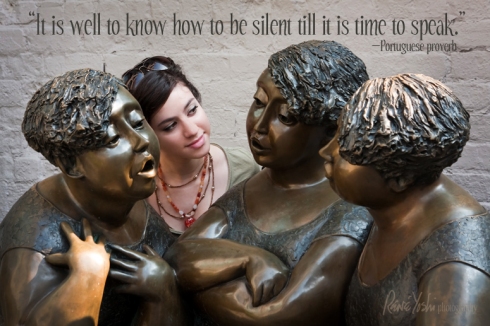
Have you ever had people vent to you about someone with whom they were all having a problem, but no one seemed to want to confront that person? Have you ever vented to someone only to have that person talk to the other about whom you vented in a way that made it obvious you had talked? Or have you been the one to disclose information that would have been better left unsaid? Or perhaps it’s all of the above? I have. It is bound to happen within groups of people, whether it’s with families, friends, co-workers or within churches. Although this isn’t a post about motherhood, I think mothers have especially been put into those situations as they are put into the role of mediator. With the upcoming holiday season and family gatherings, I hope you can learn from some of the mistakes I’ve made over the course of my life.
Mistake #1: Not encouraging the offended to talk to the offender first.
Although a mediator is sometimes needed for some circumstances, Jesus said, “Moreover if thy brother shall trespass against thee, go and tell him his fault between thee and him alone: if he shall hear thee, thou hast gained thy brother. But if he will not hear thee, then take with thee one or two more, that in the mouth of two or three witnesses every word may be established.” (Matthew 18:15, 16).
So if the offended person isn’t willing to try and talk to the offender first, then leave it in her hands. Don’t get involved, unless, of course, it is a very sensitive issue like in the case of physical or sexual abuse.
Mistake #2: Mediating between two people without both being present.
If the offended person has already tried to talk to the offender with no resolution, offer to go and talk to the offender together. As a Portuguese proverb says, “Let not him that has a mouth ask another to blow.” In other words, we shouldn’t ask someone else to do something we ourselves are capable of doing, and we shouldn’t allow someone to become co-dependent when they are capable of doing it themselves. People can speak about the issue better than we can, unless we, too, are involved and agree. The intention is not to gang up on another, but to get to the truth and bring about a resolution and peace.
“The go-between wears out a thousand sandals.” —Japanese proverb
Mistake #3: Drawing conclusions before hearing both sides.
“He that is first in his own cause seemeth just; but his neighbor cometh and searcheth him.” —Proverbs 18:17
“Hear one man before you answer; hear several before you decide.” —Danish proverb
“You’re all up in the Kool-Aid and you don’t even know what the flavor is!” —Hector Badeau (in response to eavesdropping)
Mistake #4: Remaining silent instead of speaking up.
Although there is a time and place for everything, don’t leave someone hanging by remaining silent when they are trusting you to speak up. Otherwise, you could appear to agree with the offender and throw the offended under the bus. Stand up for what is right.
“Silence in the face of evil is itself evil: God will not hold us guiltless. Not to speak is to speak. Not to act is to act.” —Dietrich Bonhoeffer
“The one who is silent is seen to consent.” —Latin proverb
Mistake #5: Talking about a private matter in mixed company.
Although the subject matter may not necessarily be private, talking about a matter of which not everyone is aware or involved can make things very awkward and cause others to draw false conclusions.
“True eloquence consists of saying all that is needed and only what is needed.” —François VI, Duke of de la Rochefoucauld
“Be silent or let thy words be worth more than silence.” —Pythagoras
“Never miss a good chance to shut up.” —American proverb
Mistake #6: The written word versus the spoken word.
Sometimes writing things down or typing things out can help work out our thoughts and emotions, but sometimes we need to be careful about sending those thoughts in writing before speaking to the person, because as a Spanish proverb says, “The pen is less inhibited in speaking than the tongue.” That goes for texting and posting things online as well. Talking to a person face-to-face is preferable if possible, because tone of voice and body language can speak volumes. It’s harder to be mean in person, too.
Mistake #7: Trying to reason with an unreasonable person.
Proverbs 23:9 says, “Speak not in the ears of a fool: for he will despise the wisdom of thy words.” Sometimes it is wiser to remain silent and avoid unreasonable people, or if absolutely necessary, especially when it comes to family, just try to grit your teeth and bear them when you have to be around them.
“It is well to know how to be silent till it is time to speak.” —Portuguese proverb
“Lord, deliver me from the urge to open my mouth when I should shut it. Give me wisdom to keep silent when silence is wise. Remind me that not everything needs to be said, and that there are very few things that need to be said by me.” —Elisabeth Elliot













